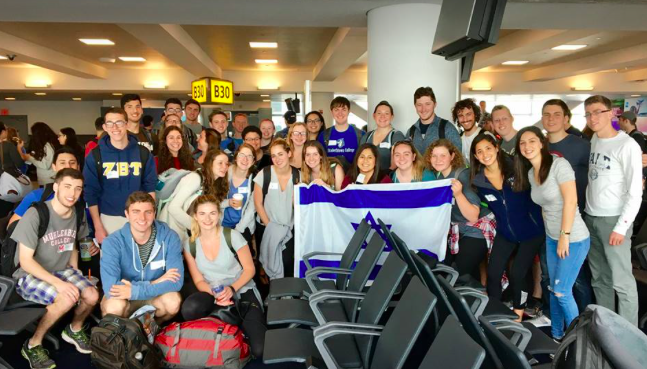Leading Researcher on Campus Jewish Life Rejects Report of ‘Devastating Loss’ of Support for Israel Among Young Jews
 by Rachel Frommer
by Rachel Frommer

Muhlenberg College students head out on a Birthright trip in summer 2017. Photo: Facebook via Hillel, Taglit-Birthright Israel.
A leading social scientist and researcher of campus Jewish life told The Algemeiner on Thursday that a new report claiming there has been a “devastating loss” of support for Israel among US Jewish students did not match his findings from nearly 20 years of systematic study of the topic.
Leonard Saxe — the director of Brandeis University’s Steinhardt Social Research Institute and the Cohen Center for Modern Jewish Studies — took issue with the results and the presentation of the Brand Israel Group’s (BIG) survey, according to which Jewish students have a plummeting understanding of and connection to Israel.
Saxe, who was lead researcher on a report last year titled, “Hotspots of Antisemitism and Anti-Israel Sentiment on US Campuses,” said that in contrast to BIG, his research showed that Jewish young adults today are “much more” connected with Israel than even their parents’ were at their age.
Saxe also criticized the way BIG has released its findings, noting that the publicly-available information includes nothing about how the sample was chosen, the questions written or the data analyzed.
“Without knowing how the study was conducted, it is not possible to know what to make of the findings,” said Saxe. “Providing such information is required for professional survey researchers.”
Saxe also maintained that claims about the extent of Jewish support for anti-Israel positions, including backing of the boycott, divestment and sanctions (BDS) movement, have been overstated.
“We have found that very, very few students feel not at all connected to Israel, and virtually no Jewish students endorse BDS,” he said. “At all the campuses we’ve studied in the last 18 months, there’s a barely detectable percentage who say they support BDS. Literally a handful of people.”
“One reason for the high levels of connection to Israel is that this generation of college students are much more likely to have visited Israel and know Israelis than any previous generation. Birthright Israel is the main driver of this change, but young adults have a host of opportunities that were unavailable to their parents’ generation,” Saxe continued, stating that in the last few weeks up to 2,000 people have arrived per day in Israel through Birthright programs.
Saxe said in his studies of the impact of the 10-day trip on participants, he has found “a persistent effect that we’ve been able to measure years and a decade or more after [they return].”
Elliot Abrams, of the Council on Foreign Relations, writing in April 2016 for Mosaic Magazine, took a decidedly less optimistic view of the American Jewish community’s level of engagement with Israel. He noted that significant changes in the US Diaspora, including rising intermarriage and weakening ties to faith, had combined to make American Jews “more distant from Israel than in past generations.”
Abrams cited the 2013 Pew poll on American Jewish life, which revealed an older generation more likely to view Israel as “essential” to their Judaism and to feel “very attached” emotionally to the Jewish State than their younger counterparts.
Abrams also noted the Pew results that only about 40 percent of American Jews had ever been to Israel.
Saxe recognized that “there is a problem” among the younger Jewish population and its fraying relationship with faith, but insisted that it was not a story of antipathy toward Israel.
 Palestinian Prime Minister Announces New Reform Package
Palestinian Prime Minister Announces New Reform Package France: Man Suspected of Abducting, Raping Jewish Woman ‘to Avenge Palestine’
France: Man Suspected of Abducting, Raping Jewish Woman ‘to Avenge Palestine’ Israel Intensifies Strikes Across Gaza, Orders New Evacuations in North
Israel Intensifies Strikes Across Gaza, Orders New Evacuations in North Iran Threatens to Annihilate Israel Should It Launch a Major Attack
Iran Threatens to Annihilate Israel Should It Launch a Major Attack ‘Completely Baseless’: Reports of Mass Graves at Gaza Hospitals are False, IDF Says
‘Completely Baseless’: Reports of Mass Graves at Gaza Hospitals are False, IDF Says Columbia University Shutters Campus as Jews Fear for Safety, Critics Call for President to Resign
Columbia University Shutters Campus as Jews Fear for Safety, Critics Call for President to Resign ‘Hamas, We Love You!’ A List of the Chants, Statements From Columbia University’s ‘Gaza Solidarity Encampment’
‘Hamas, We Love You!’ A List of the Chants, Statements From Columbia University’s ‘Gaza Solidarity Encampment’ ‘Useless Pigs’: Anti-Israel Demonstrations Rage at Yale University, Forcing Police Intervention
‘Useless Pigs’: Anti-Israel Demonstrations Rage at Yale University, Forcing Police Intervention Anti-Israel Protesters Interrupt Chelsea Handler Comedy Show Because of Her Support for Jewish State
Anti-Israel Protesters Interrupt Chelsea Handler Comedy Show Because of Her Support for Jewish State Israeli Hostage Families Make Passover Plea for Return of Missing Loved Ones
Israeli Hostage Families Make Passover Plea for Return of Missing Loved Ones



 France: Man Suspected of Abducting, Raping Jewish Woman ‘to Avenge Palestine’
France: Man Suspected of Abducting, Raping Jewish Woman ‘to Avenge Palestine’ Palestinian Prime Minister Announces New Reform Package
Palestinian Prime Minister Announces New Reform Package ‘Hamas, We Love You!’ A List of the Chants, Statements From Columbia University’s ‘Gaza Solidarity Encampment’
‘Hamas, We Love You!’ A List of the Chants, Statements From Columbia University’s ‘Gaza Solidarity Encampment’ Columbia University Shutters Campus as Jews Fear for Safety, Critics Call for President to Resign
Columbia University Shutters Campus as Jews Fear for Safety, Critics Call for President to Resign ‘Completely Baseless’: Reports of Mass Graves at Gaza Hospitals are False, IDF Says
‘Completely Baseless’: Reports of Mass Graves at Gaza Hospitals are False, IDF Says